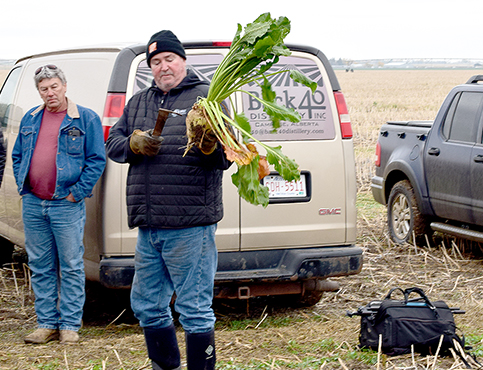Current Temperature
0.6°C
ASBG’s annual sugar beet harvest tour highlights industry’s triumphs and challenges
Posted on October 19, 2023 by admin Westwind Weekly News Photo by Erika Mathieu
Local sugar can’t be beet: Local farmer and President of the Alberta Sugar Beet Growers (ASBG), Gary Tokariuk shows off a sugar beet with intact foliage during the annual ASBG harvest event on Oct. 13.
Westwind Weekly News Photo by Erika Mathieu
Local sugar can’t be beet: Local farmer and President of the Alberta Sugar Beet Growers (ASBG), Gary Tokariuk shows off a sugar beet with intact foliage during the annual ASBG harvest event on Oct. 13.By Erika Mathieu
Westwind Weekly News
The annual sugar beet harvest is officially underway, with piling grounds near Picture Butte and Coaldale seeing truckload after truckload of sweet beets being transported throughout the region.
The field tour took place near Coaldale on Oct. 13, on a family farm which has been operating since 1928 on land which continues to be farmed by third-generation farmer, and President of Alberta Sugar Beet Growers (ASBG), Gary Tokariuk.
On the ground near the perimeter of the sugar beet field is large white pieces of beet of various sizes and shapes, some as small as a hefty baker’s potato, and some nearing or exceeding the size of a volleyball.
Looking into the field of sugar beets, the green foliage at this stage is starting to slightly yellow.
“As you can see, these beets have yellowed-off and that is where we kind of want to be. It is not always a true indicator of sugar (content), but if they are solid green, you are in trouble.”
Although the sugar beet itself is the coveted product and are paid by tonnage of extracted sugars, the defoliation process leaves behind a by-product which can then we used as livestock feed.
Once the raw sugar beet has been processed, with sugars extracted, the pulp is also used to produce animal feed, or can be processed further to to be used as fibre.
Tokariuk said he hopes to see the percentage of Canadian-grown sugar in the domestic sugar market rise, after nearly three decades of stagnation, noting Canada currently only supplies 8 per cent of the domestic sugar market.
“We need to expand. (…) Our biggest goal is to expand the industry,” adding a mere 8 per cent, “is pretty sad. There is about a two per cent growth in sugar sales per year and we would like to see that come to Canadian growers. We would like to see at least 20 per cent of sugar grown in and produced in Canada.”
During Harvest, defoliator shears off the green foliage and crown of the sugar beet, several rows at a time. Later, a digging machine, or harvester, is deployed which extract the intact beets from the ground, where the machine loads them into a large storage cage. These machines have the capacity to defoliate and dig over 15 acres of sugar beets each day. If needed, the sugar beets can be reversed back onto the grab rollers once sorted into the storage cage, which helps remove excess mud for the beets.
Tokariuk said, “the biggest thing they don’t want at the piling ground is mud. It makes the pile airtight and they don’t perspire; things like that.”
Additionally, trucking and transportation is the number one expense, so while tonnage is important, farmers want to ensure they aren’t transporting mud.
The sugar beets are transported to the only remaining sugar beet plant in Canada, which is the Rogers Sugar Factory in Taber, which is also the sole source of 100 per cent Canadian Sugar.
Tokariuk said for the 2023 growing season, the field was seeded in April.
“This year we had warm days, but we had cool nights and we had a great growing season. My extractable is higher than my sugar content was last year,” at 19 per cent. He added the median percentage of extractable sugar content is around 17.3 per cent on average.
Tokariuk said, he has never seen irrigation water storage levels lower than in 2023.
“We have kind of been to by the Alberta government that irrigation is a privilege, not a right so we understand that we have to continue to evolve as an organization,” but also said the Province’s focus on expanding irrigation is a step in the right direction.
Supporting local sugar beet farmers is as easy as keeping an eye out for Roger’s sugar packages with a black stamp on the package that starts with “22”, which indicates the sugar was produced in the Roger’s Sugar plant in Taber.
Leave a Reply
You must be logged in to post a comment.

